- Home
- Cassandra Clare
Clockwork Prince tid-2 Page 24
Clockwork Prince tid-2 Read online
Page 24
Tessa bit her lip. “Are you certain? The house looks deadly quiet. As if no one were home. Could we be wrong?”
He shook his head. “There is powerful magic at work here. Something stronger than a glamour. A true ward. Someone very much does not want us to know what is happening here tonight.” He glanced down at the invitation in her hand, shrugged, and went up to the gate. There was a bell there, and he rang it, the noise jangling Tessa’s already stretched nerves. She glared at him. He grinned. “Caelum denique, angel,” he said, and melted away into the shadows, just as the gate before her opened.
A hooded figure stood before her. Her first thought was of the Silent Brothers, but their robes were the color of parchment, and the figure that stood before her was robed in the color of black smoke. The hood hid its face completely. Wordlessly she held out her invitation.
The hand that took it from her was gloved. For a moment the hidden face regarded the invitation. Tessa could not help but fidget. In any ordinary circumstance, a young lady attending a ball alone would be so improper as to be scandalous. But this was no ordinary circumstance. At last, a voice issued from beneath the hood:
“Welcome, Miss Lovelace.”
It was a gritty voice, a voice like skin being scraped over a rough, tearing surface. Tessa’s spine prickled, and she was glad she could not see beneath the hood. The figure returned the invitation to her and stepped back, gesturing her inside; she followed, forcing herself not to look around to see if Will was following.
She was led around the side of the house, down a narrow garden path. The gardens extended for a good distance out around the house, silvery-green in the moonlight. There was a circular black ornamental pond, with a white marble bench beside it, and low hedges, carefully clipped, running alongside neat paths. The path she was on ended at a tall and narrow entrance set into the house’s side. A strange symbol was carved into the door. It seemed to shift and change as Tessa looked at it, making her eyes hurt. She looked away as her hooded companion opened the door and gestured for her to go inside.
She entered the house, and the door slammed behind her. She turned just as it shut, catching a glimpse, she thought, of the face beneath the hood. She thought she had seen something very like a cluster of red eyes in the center of a dark oval, like the eyes of a spider. She caught her breath as the door clicked shut and she was plunged into darkness.
As she reached, blindly, for the handle of the door, light sprang up all around her. She was standing at the foot of a long, narrow staircase that led upward. Torches burning with a greenish flame—not witchlight—ran up the sides of the stairs.
At the top of the stairs was a door. Another symbol was painted on this one. Tessa felt her mouth go even dryer. It was the ouroboros, the double serpent. The symbol of the Pandemonium Club.
For a moment she felt frozen with fear. The symbol brought bleak memories rushing back: the Dark House; the Sisters torturing her, trying to force her to Change; Nate’s betrayal. She wondered what Will had said to her in Latin before he had vanished. “Courage,” no doubt, or some variant of that. She thought of Jane Eyre, bravely facing down the angry Mr. Rochester; Catherine Earnshaw, who when mauled by a savage dog “did not yell out—no! she would have scorned to do it.” And lastly she thought of Boadicea, who Will had told her was “braver than any man.”
It’s just a ball, Tessa, she told herself, and reached for the knob. Just a party.
She had never been to a ball before, of course. She knew only a little of what to expect, and all of that was from books. In Jane Austen’s books the characters were constantly waiting for there to be a ball, or arranging a ball, and often an entire village seemed to be involved in the planning and location of the ball. Whereas in other books, such as Vanity Fair, they were grand backdrops against which scheming and plotting occurred. She knew that there would be a dressing room for the ladies, where she could leave her shawl, and one for the men, where they could safely dispose of hats, overcoats, and walking sticks. There ought to be a dance card for her, where the names of the men who had asked her to dance could be marked down. It was rude to dance more than a few dances in a row with the same gentleman. There should be a grand, beautifully decorated ballroom, and a smaller refreshment room, where there would be iced drinks and sandwiches and biscuits and tipsy cake . . .
But it was not quite like that. As the door closed behind her, Tessa found no servants hurrying to greet her, to guide her to the ladies’ dressing room and offer to take her shawl or assist her with a missing button. Instead a wash of noise and music and light struck her like a wave. She stood at the entrance to a room so grand, it was hard to believe that it fit somehow into the Lightwoods’ house. A great crystal chandelier hung from the ceiling; it was only after looking at it for several moments that Tessa realized it was shaped like a spider, with eight dangling “legs,” each of which held a collection of massive tapers. The walls, what she could see of them, were a very dark blue, and running all along the side that faced the river were French windows, some propped open to catch the breeze, for the room, despite the cool weather outside, was stifling. Beyond the windows were curved stone balconies, looking out over a view of the city. The walls were largely obscured by great swathes of shimmering fabric, loops and whorls of it hanging over the windows and moving in the faint breeze. The fabric was figured with all manner of patterns, woven in gold; the same shimmering, shifting patterns that had hurt Tessa’s eyes downstairs.
The room was crowded with people. Well, not quite people, exactly. The majority looked human enough. She caught sight also of the dead white faces of vampires, and a few of the violet and red-hued ifrits, all dressed in the height of fashion. Most, though not all, of the attendees wore masks—elaborate contraptions of gold and black, beaked Plague Doctor masks with tiny spectacles, red devil masks complete with horns. Some were bare-faced, though, including a group of women whose hair was muted tints of lavender, green, and violet. Tessa did not think they were dyes, either, and they wore their hair loose, like nymphs in paintings. Their clothes were scandalously loose as well. They were clearly uncorseted, dressed in flowing fabrics of velvet, tulle, and satin.
In and among the human guests darted figures of all sizes and shapes. There was a man, far too tall and thin to be a man, dressed in topcoat and tails, looming over a young woman in a green cloak whose red hair shone like a copper penny. Creatures that looked like great dogs roamed among the guests, their yellow eyes wide and watchful. They had rows of spikes along their backs, like drawings of exotic animals she had seen in books. A dozen or so little goblin creatures screeched and chattered to one another in an incomprehensible language. They appeared to be fighting over some food-stuff—what looked like a torn-apart frog. Tessa swallowed down bile and turned—
And saw them, where she had not before. Her mind had perhaps dismissed them as decorations, suits of armor, but they were not. Automatons lined the walls, silent and motionless. They were human in shape, like the coachman who had belonged to the Dark Sisters, and wore the livery of the Lightwood household, each with a patterned ouroboros over its left breast. Their faces were blank and featureless, like children’s sketches that had not been filled in.
Someone caught her by the shoulders. Her heart gave a great leap of fear—She had been discovered! As every muscle in her body tightened, a light, familiar voice said:
“I thought you’d never get here, Jessie dear.”
She turned and looked up into the face of her brother.
The last time Tessa had seen Nate, he had been bruised and bloodied, snarling at her in a corridor of the Institute, a knife in his hand. He had been a terrible mixture of frightening and pathetic and horrifying all at once.
This Nate was quite different. He smiled down at her—Jessamine was so much shorter than she was; it was odd not to reach to her brother’s chin, but rather to his chest—with vivid blue eyes. His fair hair was brushed and clean, his skin unmarked by bruises. He wore an elegant dress coat
and a black shirtfront that set off his fair good looks. His gloves were spotlessly white.
This was Nate as he had always dreamed of being—rich-looking, elegant, and sophisticated. A sense of contentment oozed from him—less contentment, Tessa had to admit, than self-satisfaction. He looked like Church did after he had killed a mouse.
Nate chuckled. “What is it, Jess? You look as if you’ve seen a ghost.”
I have. The ghost of the brother I once cared about. Tessa reached for Jessamine, for the imprint of Jessamine in her mind. Again it felt as if she were passing her hands through poisonous water, unable to grasp anything solid. “I—a sudden fear came over me, that you would not be here,” she said.
This time his laugh was tender. “And miss a chance to see you? Don’t be a foolish girl.” He glanced around, smiling. “Lightwood should lay himself out to impress the Magister more often.” He held out a hand to her. “Would you do me the honor of favoring me with a dance, Jessie?”
Jessie. Not “Miss Lovelace.” Any doubt Tessa might have had that their attachment was serious indeed was gone. She forced her lips into a smile. “Of course.”
The orchestra—a collection of small purple-skinned men dressed in silvery netting—was playing a waltz. Nate took her hand and drew her out onto the floor.
Thank God, Tessa thought. Thank God she’d had years of her brother swinging her around the living room of their tiny flat in New York. She knew exactly how he danced, how to fit her movements to his, even in this smaller, unfamiliar body. Of course, he had never looked down at her like this—tenderly, with lips slightly parted. Dear God, what if he kissed her? She had not thought of the possibility. She would be sick all over his shoes if he did. Oh, God, she prayed. Let him not try.
She spoke rapidly, “I had dreadful trouble sneaking out of the Institute tonight,” she said. “That little wretch Sophie nearly found the invitation.”
Nate’s grip tightened on her. “But she didn’t, did she?”
There was a warning in his voice. Tessa sensed she was already close to a serious gaffe. She tried a quick glance around the room—Oh, where was Will? What had he said? Even if you don’t see me, I’ll be there? But she had never felt so much on her own.
With a deep breath she tossed her head in her best imitation of Jessamine. “Do you take me for a fool? Of course not. I rapped her skinny wrist with my mirror, and she dropped it immediately. Besides, she probably can’t even read.”
“Truly,” said Nate, relaxing visibly, “they could have found you a lady’s maid who more befits a lady. One who speaks French, can sew . . .”
“Sophie can sew,” Tessa said automatically, and could have slapped herself. “Passably,” she amended, and batted her eyelashes up at Nate. “And how have you been keeping since the last time we saw each other?” Not that I have the slightest idea when that might have been.
“Very well. The Magister continues to favor me.”
“He is wise,” Tessa breathed. “He recognizes an invaluable treasure when he sees one.”
Nate touched her face lightly with a gloved hand. Tessa willed herself not to stiffen. “All down to you, my darling. My veritable little mine of information.” He moved closer to her. “I see you wore the dress I asked you to,” he whispered. “Ever since you described how you wore it to your last Christmas ball, I have yearned to see you in it. And may I say that you dazzle the eyes?”
Tessa’s stomach felt as if it were trying to force its way up into her throat. Her eyes darted around the room again. With a lurch of recognition, she saw Gideon Lightwood, cutting a fine figure in his evening dress, though he stood stiffly against one of the walls as if plastered there. Only his eyes moved around the room. Gabriel was wandering to and fro, a glass of what looked like lemonade in his hand, his eyes glowing with curiosity. She saw him go up to one of the girls with long lavender hair and begin a conversation. So much for any hope that the boys did not know what their father was up to, she thought, glancing away from Gabriel in irritation. And then she saw Will.
He was leaning against the wall opposite her, between two empty chairs. Despite his mask she felt as if she could see directly into his eyes. As if he were standing close enough to touch. She would have half-expected him to look amused at her predicament, but he did not; he looked tense, and furious, and . . .
“God, I’m jealous of every other man who looks at you,” Nate said. “You should be looked at only by me.”
Good Lord, Tessa thought. Did this line of talk really work on most women? If her brother had come to her with the aim of asking her advice on these pearls, she would have told him straight off that he sounded like an idiot. Though perhaps she only thought he sounded like an idiot because he was her brother. And despicable. Information, she thought. I must get information and then get away from him, before I really am sick.
She looked for Will again, but he was gone, as if he had never been there. Still, she believed him now that he was somewhere, watching her, even if she couldn’t see him. She plucked up her nerve, and said, “Really, Nate? Sometimes I fear you value me only for the information I can give you.”
For a moment he stopped and was stock-still, almost jerking her out of the dance. “Jessie! How can you even think such a thing? You know how I adore you.” He looked at her reproachfully as they began to move to the music again. “It is true that your connection to the Nephilim of the Institute has been invaluable. Without you we would never have known they were going to York, for instance. But I thought you knew that you were helping me because we are working toward a future together. When I have become the Magister’s right hand, darling, think how I will be able to provide for you.”
Tessa laughed nervously. “You’re right, Nate. It’s only that I get frightened sometimes. What if Charlotte were to find out I was spying for you? What would they do to me?”
Nate swung her around easily. “Oh, nothing, darling; you’ve said it yourself, they’re cowards.” He looked past her and raised an eyebrow. “Benedict, up to his old tricks,” he said. “Rather disgusting.”
Tessa looked around and saw Benedict Lightwood leaning back on a scarlet velvet sofa near the orchestra. He was coatless, a glass of red wine in one hand, his eyes half-lidded. Sprawled across his chest, Tessa saw to her shock, was a woman—or at least it had the form of a woman. Long black hair worn loose, a low-cut black velvet gown—and the heads of little serpents poking out from her eyes, hissing. As Tessa watched, one of them extended a long, forked tongue and licked the side of Benedict Lightwood’s face.
“That’s a demon,” Tessa breathed, forgetting for a moment to be Jessamine. “Isn’t it?”
Fortunately Nate seemed to find nothing odd about the question. “Of course it is, silly bunny. That’s what Benedict fancies. Demon women.”
Will’s voice echoed in Tessa’s ears, I would be surprised if some of the elder Lightwood’s nocturnal visits to certain houses in Shadwell haven’t left him with a nasty case of demon pox. “Oh, ugh,” she said.
“Indeed,” said Nate. “Ironic, considering the high-and-mighty manner in which the Nephilim conduct themselves. I ask myself often why Mortmain favors him so and wishes to see him installed in the Institute so badly.” Nate sounded peevish.
Tessa had already guessed as much, but the knowledge that Mortmain was most assuredly behind Benedict’s fierce determination to take the Institute from Charlotte still felt like a blow. “I just don’t see,” she said, trying her best to adopt Jessie’s lightly peevish demeanor, “what use it will be to the Magister. It’s just a big stuffy old building. . . .”
Nate laughed indulgently. “It’s not the building, silly thing. It’s the position. The head of the London Institute is one of the most powerful Shadowhunters in England, and the Magister controls Benedict as if he were a puppet. Using him, he can destroy the Council from within, while the automaton army destroys them from without.” He spun her expertly as the dance required; only Tessa’s years of practice dancing with Na
te kept her from falling over, so distracted was she by shock. “Besides, it’s not quite true that the Institute contains nothing of value. Access to the Great Library alone will be invaluable for the Magister. Not to mention the weapons room . . .”
“And Tessa.” She clamped down on her voice so it wouldn’t tremble.
“Tessa?”
“Your sister. The Magister still wants her, doesn’t he?”
For the first time Nate looked at her with a puzzled surprise. “We’ve been over this, Jessamine,” he said. “Tessa will be arrested for illegal possession of articles of dark magic, and sent to the Silent City. Benedict will bring her forth from there and deliver her to the Magister. It is all part of whatever bargain they struck, though what Benedict is getting from it is not clear to me yet. It must be something quite significant, or he would not be so willing to turn on his own.”
Arrested? Possession of articles of dark magic? Tessa’s head spun.
Nate’s hand slipped around the back of her neck. He was wearing gloves, but Tessa couldn’t rid herself of the feeling that something slimy was touching her skin. “My little Jessie,” he murmured. “You behave almost as if you’ve forgotten your own part in this. You did hide the Book of the White in my sister’s room as we asked you to, did you not?”
“Of—of course I did. I was only joking, Nate.”
“That’s my good girl.” He was leaning closer. He was definitely going to kiss her. It was most improper, but then nothing about this place could be considered proper. In a state of absolute horror, Tessa sputtered:
“Nate—I feel dizzy—as if I might faint. I think it’s the heat. If you could fetch me a lemonade?”

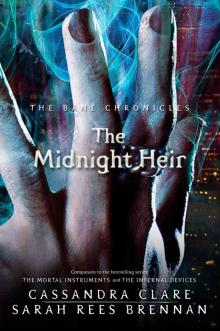 The Midnight Heir
The Midnight Heir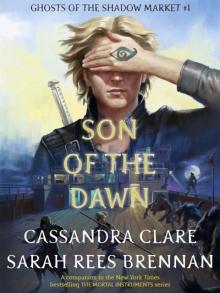 Son of the Dawn
Son of the Dawn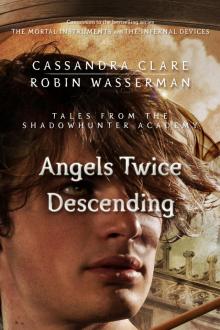 Angels Twice Descending
Angels Twice Descending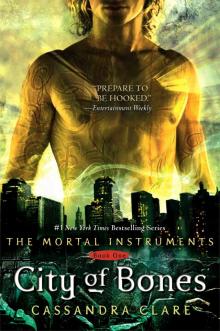 City of Bones
City of Bones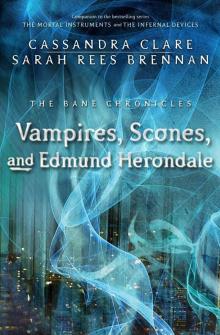 Vampires, Scones, and Edmund Herondale
Vampires, Scones, and Edmund Herondale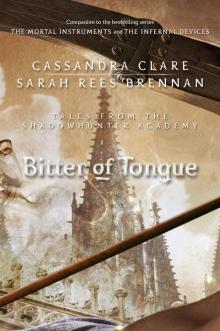 Bitter of Tongue
Bitter of Tongue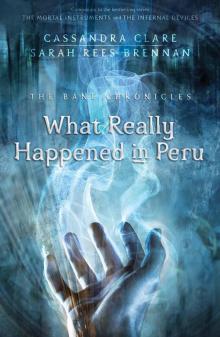 What Really Happened in Peru
What Really Happened in Peru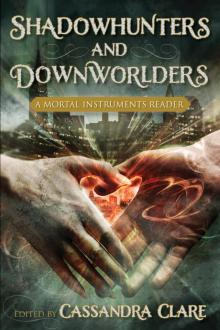 Shadowhunters and Downworlders
Shadowhunters and Downworlders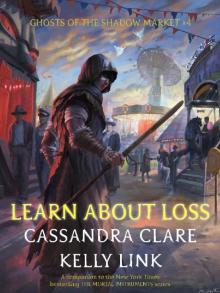 Learn About Loss
Learn About Loss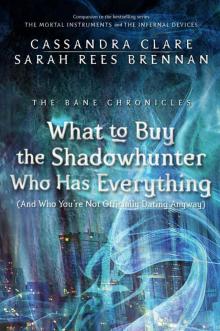 What to Buy the Shadowhunter Who Has Everything
What to Buy the Shadowhunter Who Has Everything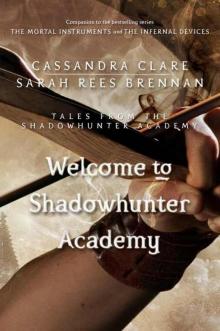 Welcome to Shadowhunter Academy
Welcome to Shadowhunter Academy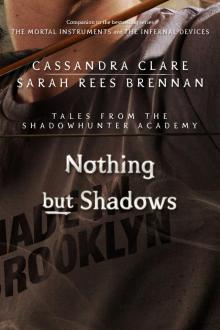 Nothing but Shadows
Nothing but Shadows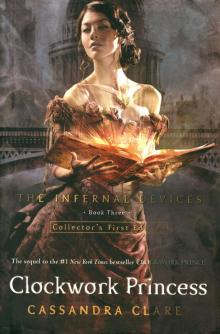 Clockwork Prince
Clockwork Prince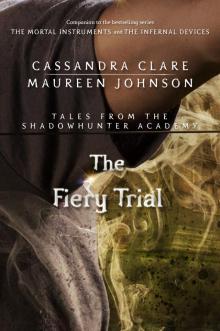 The Fiery Trial
The Fiery Trial City of Glass
City of Glass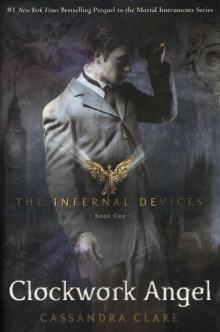 Clockwork Angel
Clockwork Angel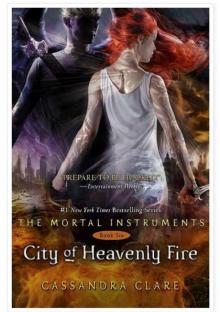 City of Heavenly Fire
City of Heavenly Fire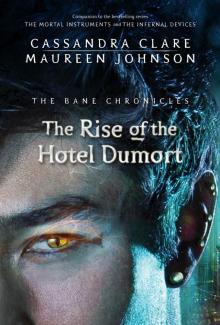 The Rise of the Hotel Dumort
The Rise of the Hotel Dumort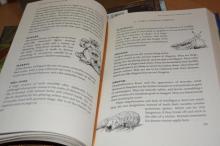 The Shadowhunters Codex
The Shadowhunters Codex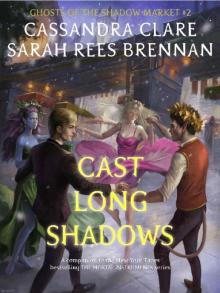 Cast Long Shadows
Cast Long Shadows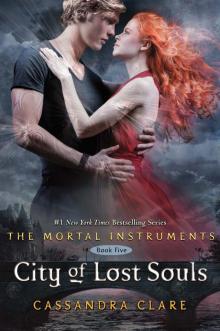 City of Lost Souls
City of Lost Souls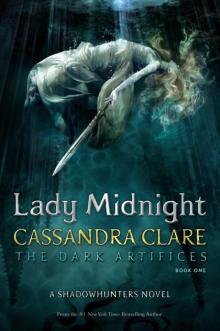 Lady Midnight
Lady Midnight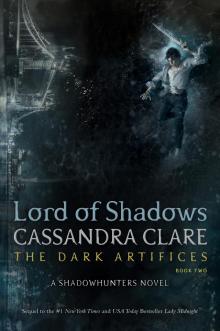 Lord of Shadows
Lord of Shadows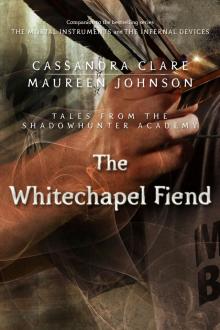 The Whitechapel Fiend
The Whitechapel Fiend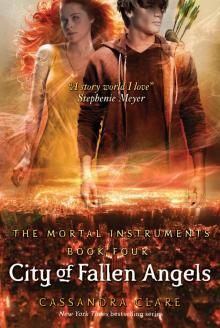 City of Fallen Angels
City of Fallen Angels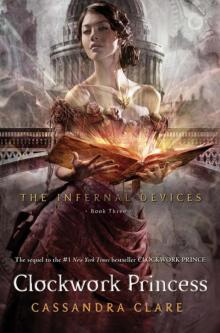 Clockwork Princess
Clockwork Princess Queen of Air and Darkness
Queen of Air and Darkness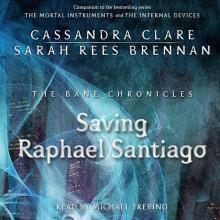 Saving Raphael Santiago
Saving Raphael Santiago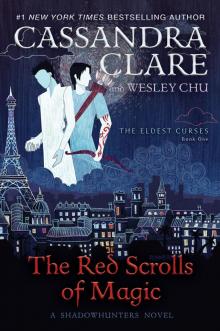 The Red Scrolls of Magic
The Red Scrolls of Magic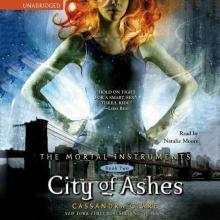 City of Ashes
City of Ashes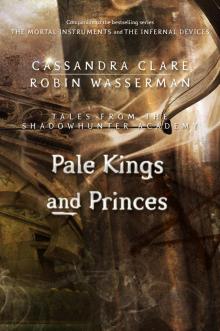 Pale Kings and Princes
Pale Kings and Princes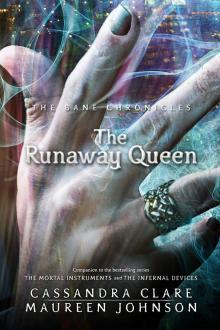 The Runaway Queen
The Runaway Queen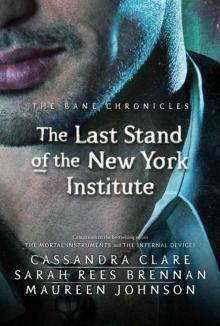 The Last Stand of the New York Institute
The Last Stand of the New York Institute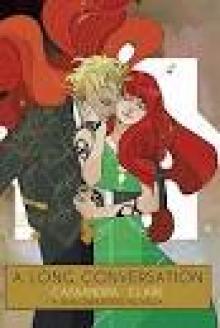 A Long Conversation (The Shadowhunter Chronicles)
A Long Conversation (The Shadowhunter Chronicles) The Lost Book of the White
The Lost Book of the White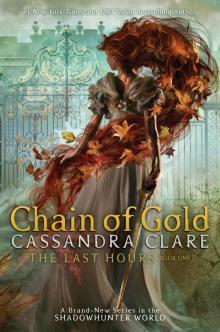 Chain of Gold
Chain of Gold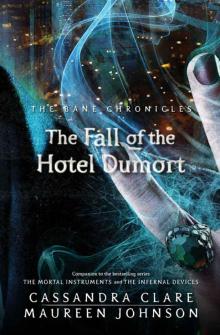 The Fall of the Hotel Dumort
The Fall of the Hotel Dumort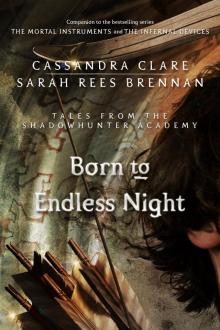 Born to Endless Night
Born to Endless Night The Lost Herondale
The Lost Herondale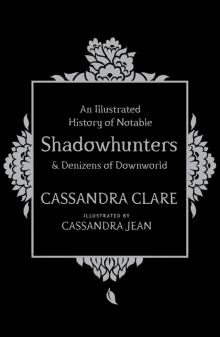 An Illustrated History of Notable Shadowhunters & Denizens of Downworld
An Illustrated History of Notable Shadowhunters & Denizens of Downworld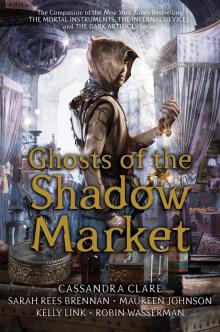 Ghosts of the Shadow Market
Ghosts of the Shadow Market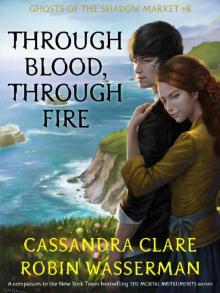 Through Blood, Through Fire
Through Blood, Through Fire Every Exquisite Thing
Every Exquisite Thing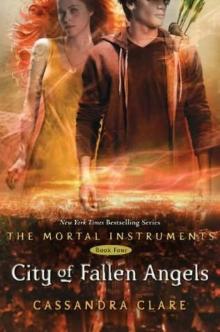 City of Fallen Angels mi-4
City of Fallen Angels mi-4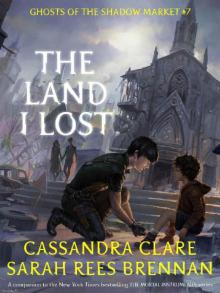 The Land I Lost (Ghosts of the Shadow Market Book 7)
The Land I Lost (Ghosts of the Shadow Market Book 7) Queen of Air and Darkness (The Dark Artifices #3)
Queen of Air and Darkness (The Dark Artifices #3)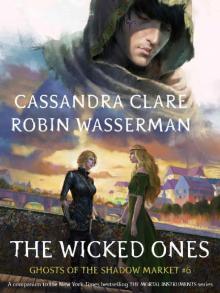 The Wicked Ones (Ghosts of the Shadow Market Book 6)
The Wicked Ones (Ghosts of the Shadow Market Book 6)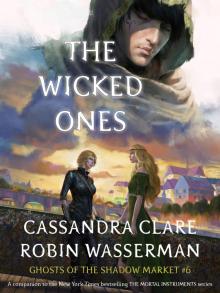 The Wicked Ones
The Wicked Ones A Deeper Love
A Deeper Love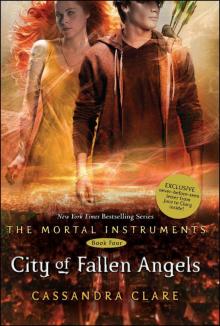 City of Fallen Angels (4)
City of Fallen Angels (4)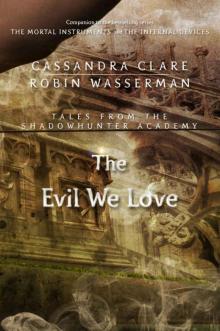 The Evil We Love (Tales from the Shadowhunter Academy Book 5)
The Evil We Love (Tales from the Shadowhunter Academy Book 5)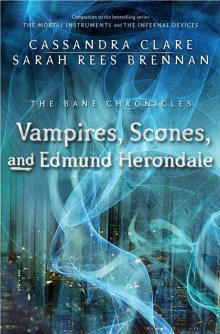 Vampires, Scones, and Edmund Herondale tbc-3
Vampires, Scones, and Edmund Herondale tbc-3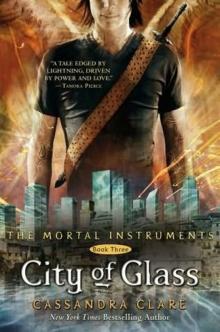 City of Glass mi-3
City of Glass mi-3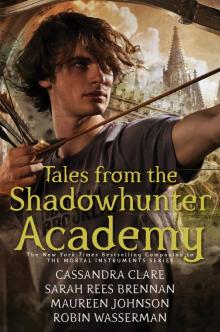 Tales from the Shadowhunter Academy
Tales from the Shadowhunter Academy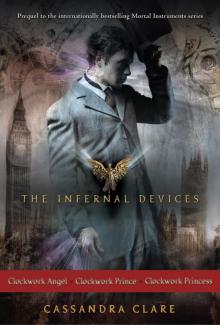 The Infernal Devices Series
The Infernal Devices Series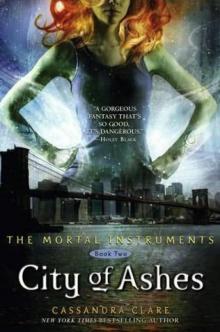 City of Ashes mi-2
City of Ashes mi-2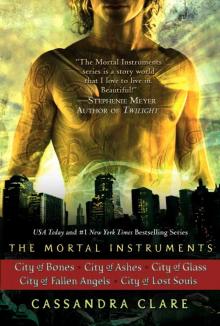 Cassandra Clare: The Mortal Instruments Series
Cassandra Clare: The Mortal Instruments Series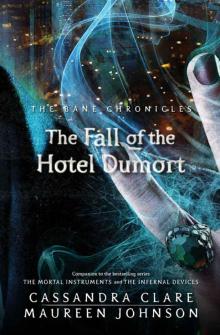 The Bane Chronicles 7: The Fall of the Hotel Dumort
The Bane Chronicles 7: The Fall of the Hotel Dumort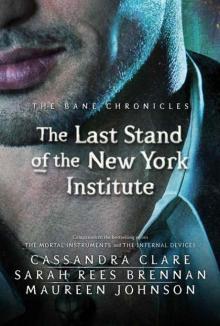 The Last Stand of the New York Institute (The Bane Chronicles)
The Last Stand of the New York Institute (The Bane Chronicles) The Land I Lost
The Land I Lost![Saving Raphael Santiago - [Bane Chronicles 06] Read online](http://i1.bookreadfree.com/i1/04/03/saving_raphael_santiago_-_bane_chronicles_06_preview.jpg) Saving Raphael Santiago - [Bane Chronicles 06]
Saving Raphael Santiago - [Bane Chronicles 06]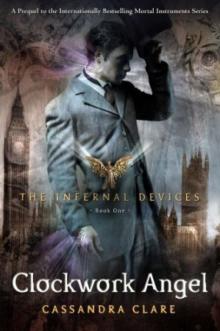 Clockwork Angel tid-1
Clockwork Angel tid-1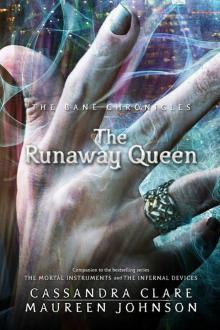 The Runaway Queen tbc-2
The Runaway Queen tbc-2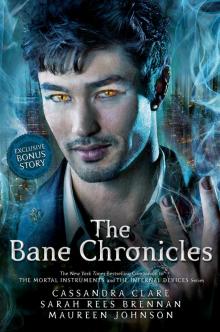 The Bane Chronicles
The Bane Chronicles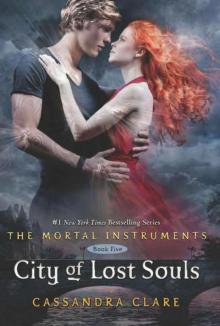 City of Lost Souls mi-5
City of Lost Souls mi-5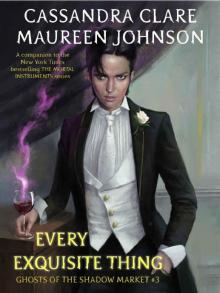 Every Exquisite Thing (Ghosts of the Shadow Market Book 3)
Every Exquisite Thing (Ghosts of the Shadow Market Book 3) Shadowhunter’s Codex
Shadowhunter’s Codex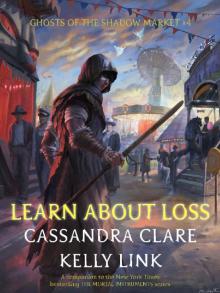 Learn About Loss (Ghosts of the Shadow Market Book 4)
Learn About Loss (Ghosts of the Shadow Market Book 4)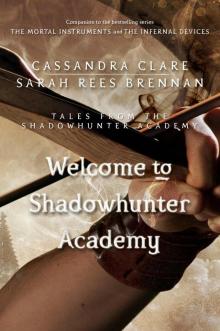 Welcome to Shadowhunter Academy (Tales from the Shadowhunter Academy Book 1)
Welcome to Shadowhunter Academy (Tales from the Shadowhunter Academy Book 1)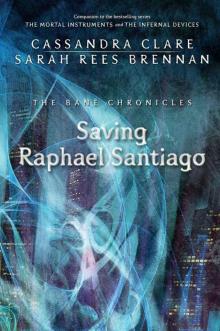 Saving Raphael Santiago tbc-6
Saving Raphael Santiago tbc-6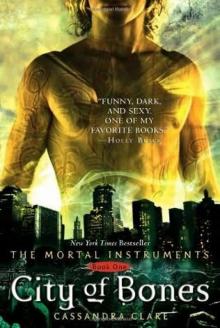 City of Bones mi-1
City of Bones mi-1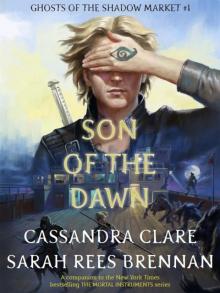 Ghosts of the Shadow Market Book 1_Son of the Dawn
Ghosts of the Shadow Market Book 1_Son of the Dawn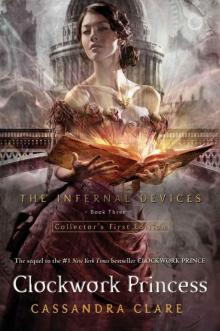 Clockwork Princess (Infernal Devices, The)
Clockwork Princess (Infernal Devices, The) Clockwork Prince tid-2
Clockwork Prince tid-2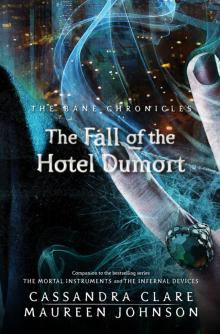 No Immortal Can Keep a Secret
No Immortal Can Keep a Secret A Deeper Love (Ghosts of the Shadow Market Book 5)
A Deeper Love (Ghosts of the Shadow Market Book 5) The Course of True Love (and First Dates)
The Course of True Love (and First Dates)